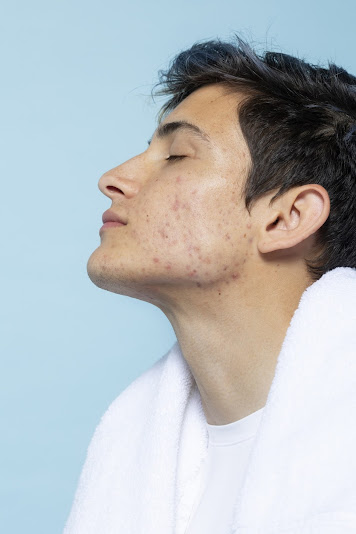Understanding Acne
Acne is a common skin problem that affects many men. Whether it’s the occasional pimple or more persistent breakouts, acne can be frustrating and impact your confidence. But don't worry—clearer skin is within reach. This guide will walk you through understanding acne, its causes, and how to treat and prevent it using simple and effective methods.
Types of Acne
Whiteheads: Small bumps with white centers, caused by clogged pores.
Blackheads: Open bumps that look dark on the surface due to trapped oil and dead skin cells.
Papules: Small red or pink bumps that can be tender.
Pustules: Pimples containing pus, usually with a red base and a white top.
Nodules: Large, painful lumps deep within the skin.
Cysts: Severe, pus-filled lumps that can cause scarring.
Causes of Acne
Hormones: Increased hormones during puberty can lead to more oil production.Genetics: Acne can run in families.
Diet: Foods high in sugar and dairy may trigger breakouts.
Stress: Stress can increase hormone levels, leading to acne.
Skin Care Products: Some products can clog pores or irritate the skin.
Hygiene: Not washing your face regularly can lead to dirt and oil buildup.
Skincare Routine for Acne-Prone Skin
Creating a daily skincare routine can help manage and reduce acne. Here’s a simple routine to follow:
1. Cleansing
Morning and Night: Use a gentle cleanser twice a day to remove dirt, oil, and impurities.Choose: A cleanser with salicylic acid or benzoyl peroxide can help unclog pores and reduce bacteria.
2. Toning (Optional)
After Cleansing: Apply a toner to help balance your skin’s pH and remove leftover residue.Choose: An alcohol-free toner with soothing ingredients like witch hazel or tea tree oil.
3. Treating
Spot Treatment: Use acne treatment products like gels or creams on active pimples.Choose: Products with benzoyl peroxide, salicylic acid, or sulfur can reduce inflammation and kill bacteria.
Whole Face: Apply a thin layer of an acne-fighting product all over your face if you have frequent breakouts.
4. Moisturizing
Morning and Night: Use a light, oil-free moisturizer to keep your skin hydrated.Choose: A non-comedogenic (won’t clog pores) moisturizer to prevent additional breakouts.
5. Sunscreen
Morning: Apply a broad-spectrum sunscreen with at least SPF 30 to protect your skin from UV rays.Choose: A lightweight, oil-free sunscreen to avoid clogging pores.
Lifestyle Tips to Manage Acne
Skincare isn’t the only way to combat acne. Incorporating healthy habits can make a big difference.
1. Healthy Diet
Avoid: Foods high in sugar, dairy, and refined carbs, which can worsen acne.Include: More fruits, vegetables, whole grains, and lean proteins in your diet.
2. Stay Hydrated
Drink Water: Aim for at least 8 glasses a day to keep your skin hydrated and flush out toxins.3. Exercise Regularly
Benefits: Exercise reduces stress and improves circulation, which can help your skin.Tip: Shower and cleanse your face after working out to remove sweat and bacteria.
4. Manage Stress
Techniques: Practice stress-reducing activities like meditation, deep breathing, or yoga.Sleep: Aim for 7-9 hours of sleep per night to help your skin repair itself.
5. Hands Off
Don’t Touch: Avoid touching your face throughout the day to prevent transferring bacteria and oil.No Picking: Don’t pick or pop pimples, as this can lead to scarring and more inflammation.
Common Acne Treatments
If over-the-counter products and lifestyle changes don’t fully control your acne, consider these treatments:
1. Topical Treatments
Retinoids: Help unclog pores and reduce inflammation.Antibiotics: Reduce bacteria and redness.
AHA/BHA: Exfoliants like glycolic acid and salicylic acid help clear dead skin cells.
2. Oral Medications
Antibiotics: Fight bacteria from within and reduce inflammation.Birth Control Pills: Can regulate hormones that cause acne in some men.
Isotretinoin: A powerful medication for severe acne, but with potential side effects.
3. Professional Treatments
Chemical Peels: Remove the top layer of skin to reduce acne and improve texture.Laser Therapy: Reduces bacteria and decreases oil production.
Extraction: Professional removal of blackheads and whiteheads.
4. Natural Remedies
Tea Tree Oil: Has antibacterial properties and can be applied to pimples.Aloe Vera: Soothes inflammation and helps heal acne-prone skin.
Honey: Contains antibacterial properties and can be used as a mask.
When to See a Dermatologist
If your acne is severe, painful, or not improving with over-the-counter treatments, it’s time to see a dermatologist. They can provide stronger medications and treatments tailored to your skin type and severity of acne.
Conclusion
Dealing with acne can be challenging, but with the right skincare routine and healthy habits, you can achieve clearer skin. Start with a basic routine of cleansing, treating, and moisturizing, and make sure to protect your skin with sunscreen during the day. Combine this with a balanced diet, regular exercise, and stress management for the best results. Remember, consistency is key, and if you’re struggling, don’t hesitate to seek professional help. Your journey to clearer skin starts now!
FAQs for Must-Know Acne Tips Every Man Needs
1. What causes acne in men?Acne is mainly caused by excess oil production, clogged pores, bacteria, hormones, genetics, and lifestyle factors like diet and stress.
Yes, improper shaving techniques or using dull razors can irritate the skin, leading to razor bumps and acne.
A routine including cleansing, spot treatment, moisturizing, and sunscreen helps control acne and keep skin healthy.
Wash your face twice a day—morning and night—with a gentle cleanser to remove excess oil and dirt.
Yes, high-sugar and dairy-rich diets may trigger breakouts. Eating whole foods and staying hydrated can improve skin health.
Yes, using an oil-free, non-comedogenic moisturizer prevents dryness and keeps skin balanced without clogging pores.
Look for salicylic acid, benzoyl peroxide, tea tree oil, or retinoids to help clear acne and prevent new breakouts.
No, popping pimples can lead to scarring, infections, and more inflammation. Use spot treatments instead.
If acne is severe, painful, or not improving with over-the-counter treatments, consult a dermatologist for professional care.
Yes, stress increases hormone levels, leading to more oil production and breakouts. Managing stress with exercise and sleep can help.
